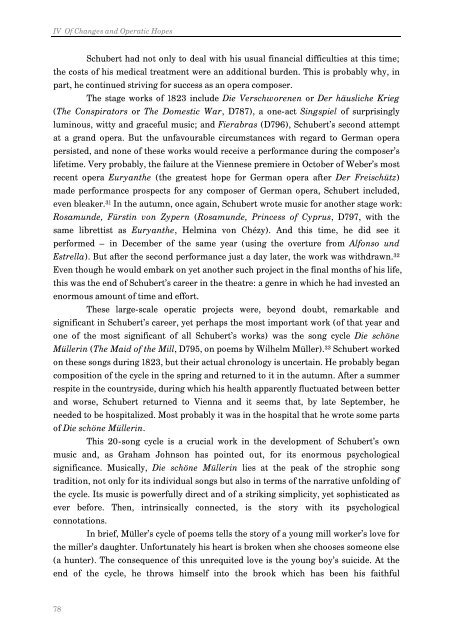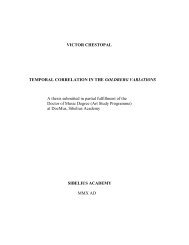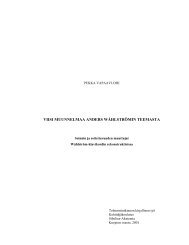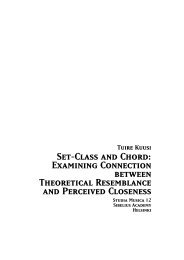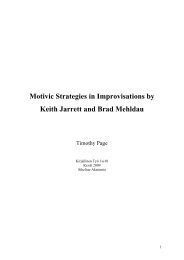The Unfinished Piano Sonatas of Franz Schubert Javier ... - Ethesis
The Unfinished Piano Sonatas of Franz Schubert Javier ... - Ethesis
The Unfinished Piano Sonatas of Franz Schubert Javier ... - Ethesis
Create successful ePaper yourself
Turn your PDF publications into a flip-book with our unique Google optimized e-Paper software.
IV Of Changes and Operatic Hopes<br />
78<br />
<strong>Schubert</strong> had not only to deal with his usual financial difficulties at this time;<br />
the costs <strong>of</strong> his medical treatment were an additional burden. This is probably why, in<br />
part, he continued striving for success as an opera composer.<br />
<strong>The</strong> stage works <strong>of</strong> 1823 include Die Verschworenen or Der häusliche Krieg<br />
(<strong>The</strong> Conspirators or <strong>The</strong> Domestic War, D787), a one-act Singspiel <strong>of</strong> surprisingly<br />
luminous, witty and graceful music; and Fierabras (D796), <strong>Schubert</strong>’s second attempt<br />
at a grand opera. But the unfavourable circumstances with regard to German opera<br />
persisted, and none <strong>of</strong> these works would receive a performance during the composer’s<br />
lifetime. Very probably, the failure at the Viennese premiere in October <strong>of</strong> Weber’s most<br />
recent opera Euryanthe (the greatest hope for German opera after Der Freischütz)<br />
made performance prospects for any composer <strong>of</strong> German opera, <strong>Schubert</strong> included,<br />
even bleaker. 31 In the autumn, once again, <strong>Schubert</strong> wrote music for another stage work:<br />
Rosamunde, Fürstin von Zypern (Rosamunde, Princess <strong>of</strong> Cyprus, D797, with the<br />
same librettist as Euryanthe, Helmina von Chézy). And this time, he did see it<br />
performed – in December <strong>of</strong> the same year (using the overture from Alfonso und<br />
Estrella). But after the second performance just a day later, the work was withdrawn. 32<br />
Even though he would embark on yet another such project in the final months <strong>of</strong> his life,<br />
this was the end <strong>of</strong> <strong>Schubert</strong>’s career in the theatre: a genre in which he had invested an<br />
enormous amount <strong>of</strong> time and effort.<br />
<strong>The</strong>se large-scale operatic projects were, beyond doubt, remarkable and<br />
significant in <strong>Schubert</strong>’s career, yet perhaps the most important work (<strong>of</strong> that year and<br />
one <strong>of</strong> the most significant <strong>of</strong> all <strong>Schubert</strong>’s works) was the song cycle Die schöne<br />
Müllerin (<strong>The</strong> Maid <strong>of</strong> the Mill, D795, on poems by Wilhelm Müller). 33 <strong>Schubert</strong> worked<br />
on these songs during 1823, but their actual chronology is uncertain. He probably began<br />
composition <strong>of</strong> the cycle in the spring and returned to it in the autumn. After a summer<br />
respite in the countryside, during which his health apparently fluctuated between better<br />
and worse, <strong>Schubert</strong> returned to Vienna and it seems that, by late September, he<br />
needed to be hospitalized. Most probably it was in the hospital that he wrote some parts<br />
<strong>of</strong> Die schöne Müllerin.<br />
This 20-song cycle is a crucial work in the development <strong>of</strong> <strong>Schubert</strong>’s own<br />
music and, as Graham Johnson has pointed out, for its enormous psychological<br />
significance. Musically, Die schöne Müllerin lies at the peak <strong>of</strong> the strophic song<br />
tradition, not only for its individual songs but also in terms <strong>of</strong> the narrative unfolding <strong>of</strong><br />
the cycle. Its music is powerfully direct and <strong>of</strong> a striking simplicity, yet sophisticated as<br />
ever before. <strong>The</strong>n, intrinsically connected, is the story with its psychological<br />
connotations.<br />
In brief, Müller’s cycle <strong>of</strong> poems tells the story <strong>of</strong> a young mill worker’s love for<br />
the miller’s daughter. Unfortunately his heart is broken when she chooses someone else<br />
(a hunter). <strong>The</strong> consequence <strong>of</strong> this unrequited love is the young boy’s suicide. At the<br />
end <strong>of</strong> the cycle, he throws himself into the brook which has been his faithful


